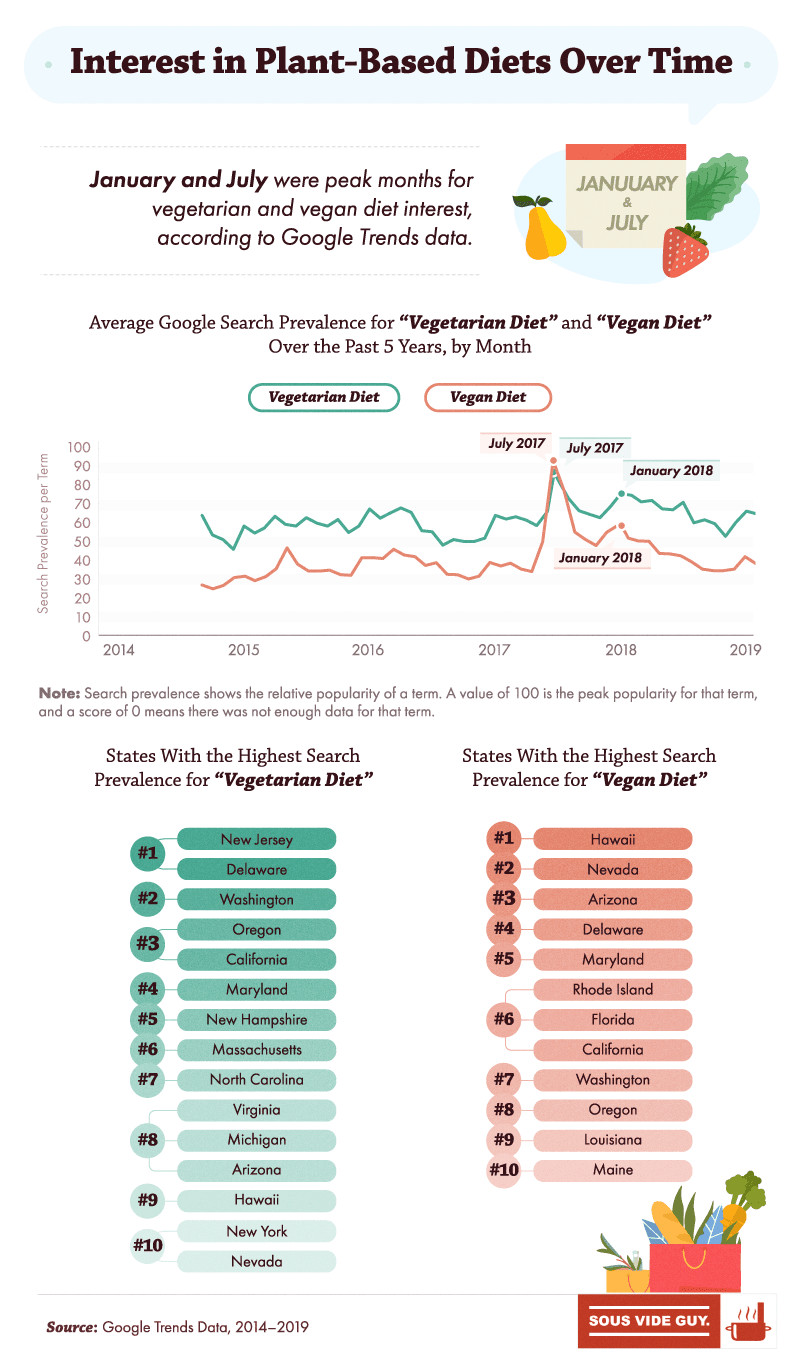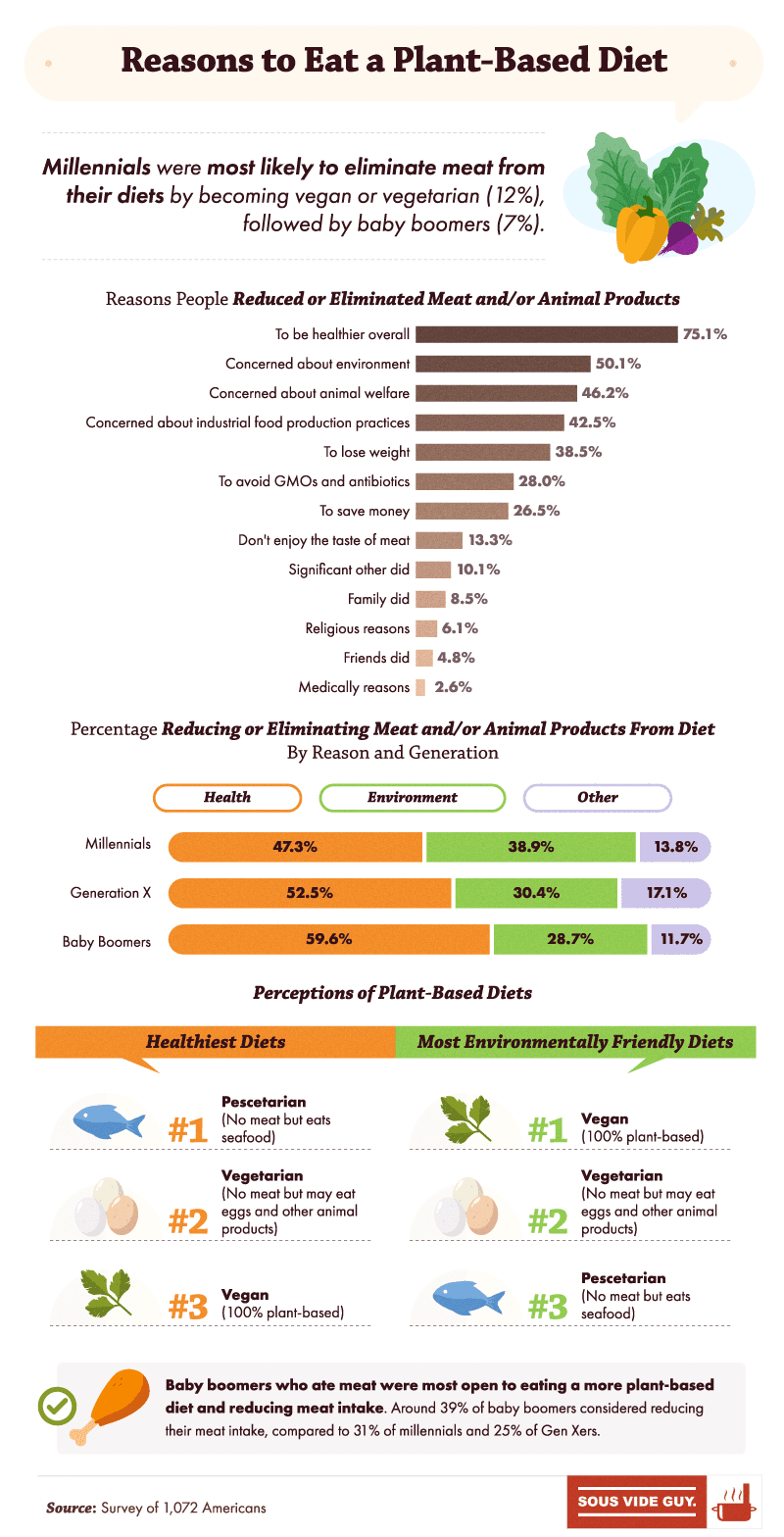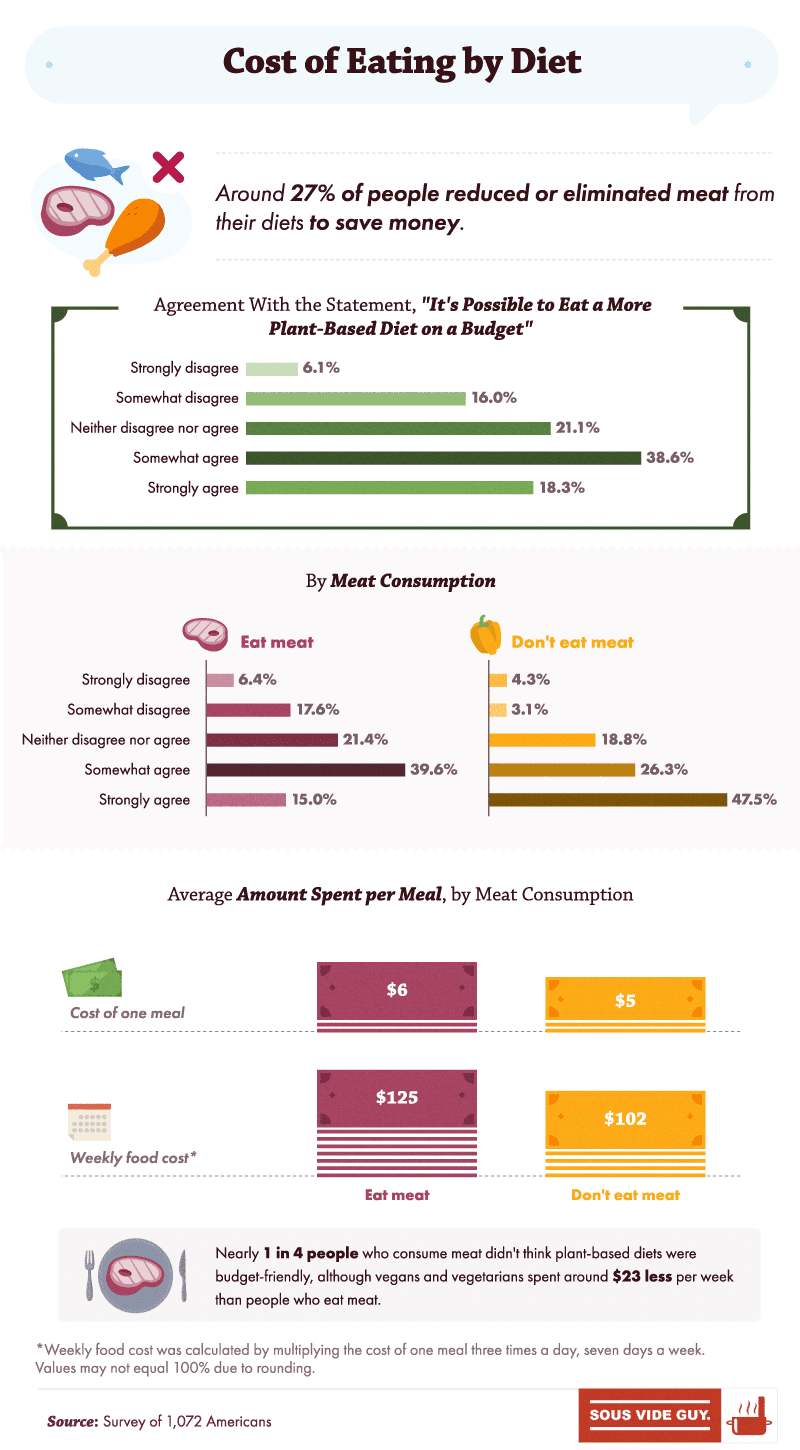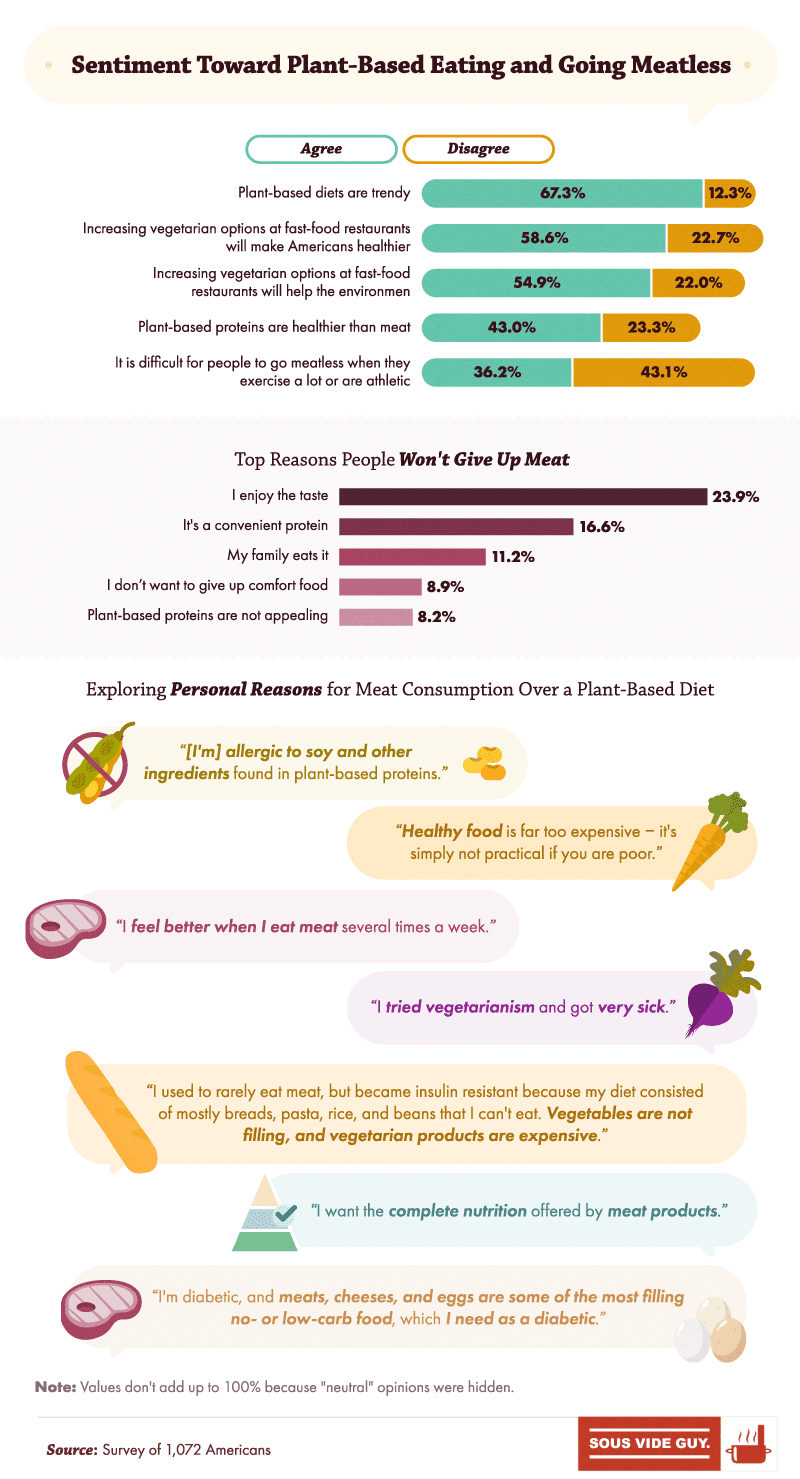From the grocery store to fast-food chains, you’ve probably noticed a new item on the menu: meatless meat. In fact, plant-based products have become popular substitutes for everything from burgers to fried “chicken.”
These vegetarian (and occasionally vegan) options don’t automatically mean an influx of people leaving behind their carnivorous lifestyles, but they do bring up compelling questions about the benefits of replacing meat in our diet. Is eating less meat better for us and the environment, as some experts believe?
For a closer look at plant-based diets, we surveyed over 1,000 Americans about their eating habits and their perceptions of going meatless. Read on as we explore how conscious Americans are of their meat intake and how much money people save, on average, by eliminating meat from their diet.
Eating Green
When it comes to eating meat, there’s no clear consensus on its impact. On the one hand, research suggests anything from vision to digestion can be negatively impacted by consuming too much meat. However, some recent studies suggest that eating red meat may not be as hazardous as previously thought. No matter how you slice it, though, meat is pretty controversial.
Despite conflicting reports about the safety of eating meat, more than 3 in 4 Americans surveyed acknowledged trying to be conscious of consuming animal products. While over 26% of respondents said they don’t restrict their meat consumption, another 74% said they placed limitations on their meat consumption. Nearly 32% of Americans said they eat meat but occasionally have plant-based meals, followed by over 18% who identified as “flexitarian” (a predominantly vegetarian diet with the occasional inclusion of meat). Roughly 6% identified as vegetarian and 3% as vegan.
Diet Trends
For some people, reducing or eliminating meat consumption may not entirely be about health benefits or animal cruelty. Research continues to point to ways that reducing or eliminating meat can have a positive impact on the environment. According to one study, it takes over 2,000 gallons of water to produce a single steak. Another study found that if every American replaced chicken with a plant-based meal once a week, the carbon dioxide savings would be equal to taking more than 500,000 cars off the road.
These environmental concerns may have contributed to a spike in vegetarian and vegan diet Google searches in July of 2017, as the U.S. prepared to exit the Paris climate accord. However, except for that summer’s spike, Google searches for plant-based diets in the U.S. have remained relatively steady since 2015. Among Americans researching vegetarian diets, New Jersey, Delaware, Washington, Oregon, and California had the highest search prevalence between 2015 and 2019. For people researching vegan diets, we found the highest search inquires in Hawaii, Nevada, Arizona, Delaware, and Maryland.
Here are some of the states with the lowest search prevalence per term:
| States with the lowest search prevalence for “vegetarian diet” | States with the lowest search prevalence for “vegan diet” |
|---|---|
| North Dakota | South Dakota |
| Wyoming | Wyoming |
| Alaska | West Virginia |
| Nebraska | North Dakota |
| South Dakota | Iowa |
Generational Diets
Millennials were the most likely generation to eliminate meat from their diets by becoming vegetarian or vegan (12%), followed by baby boomers (7%). The most popular reason for cutting out meat? To be healthier overall. While more than 3 in 4 people who either reduced or eliminated meat from their diets said health was the leading cause, concerns for the environment (50%) and animal welfare (46%) were popular as well.
While health was the leading motivation for reducing or eliminating meat intake across all generations, millennials were most likely to modify their diets for environmental reasons (39%) compared to Gen Xers (30%) and baby boomers (29%). However, baby boomers (39%) were the most likely generation to consider making a change in their diets moving forward.
Selective Savings
In 2019, the USDA expected the price of meat (including beef and chicken) to rise. Roughly 27% of those polled acknowledged reducing or eliminating their meat intake to save money.
While roughly 1 in 4 people who consumed meat didn’t believe a plant-based diet was a cheaper alternative, people on meatless diets spent an average of $23 less on food every week.
Sentiment Toward Meat
Although people have their reasons for eating less meat, such as for their health and the environment, there are still plenty of misconceptions about what it means to eat less meat. Also, it’s important to respect people’s preferences, allowing them to eat in a way that is best for them.
Over 67% of respondents said plant-based diets were trendy, while another 59% believed more vegetarian options at fast-food restaurants would make Americans healthier. However, while many meat substitutes are considered safe to eat by the FDA, some meatless burgers are still high in saturated fat and sodium. Roughly 55% of people also believed that increasing the number of vegetarian options in fast-food restaurants would positively impact the environment.
Still, for some people, giving up meat is hard. Nearly 1 in 4 Americans surveyed said they wouldn’t give up meat because they enjoy the taste, and almost 17% said meat was too convenient a protein to pass up.
Making a Commitment
Reducing or eliminating anything from your diet takes a certain level of commitment, and that’s especially true when it comes to meat. As we found, the reasons people were more conscious of consuming animal products ranged from health concerns to animal welfare and the environment. While many Americans won’t completely give up meat, many are mindful of the presence of meat in their diets and are actively trying to scale back. And though there isn’t a single, magic bullet diet approach that works for everyone, major studies have suggested simply cooking your own meals can be an easy way to healthier living. At Sous Vide Guy, you can explore the best in Sous Vide devices as well as recipes featuring both meat and vegetarian ingredients. From starter kits to blog posts and product reviews, we have everything you need to make delicious and healthy meals right in your own kitchen, no matter your dietary resolution.
Methodology and Limitations
We surveyed 1,072 Americans about their eating habits, in terms of meat consumption, to measure just how many Americans are going meatless today. Survey respondents included 933 people who ate meat, 104 people who were meatless, and 35 people who were pescetarians. Around 20% of our survey respondents were baby boomers, 38% were from Generation X, and 42% were millennials. The ages of respondents ranged from 21 to 73 with a mean age of 42 and a standard deviation of 12 years. The data were weighted by age and gender to reflect the general population.
Our project also includes an analysis of Google Trends data, using search prevalence as a means to gauge regional interest in vegetarian and vegan diets over a five-year period across America. Search prevalence for Google Trends data was measured on a volume scale from 0 to 100, with 0 being no search prevalence and 100 being the highest volume of search prevalence.
Certain limitations to survey data apply, such as telescoping, exaggeration, and selective memory. Statistical testing was not performed on the survey data.
Fair Use Statement
Feel compelled to make a change in your diet? Please help share these results with your readers for any noncommercial use by including a link back to this page in your own story.






